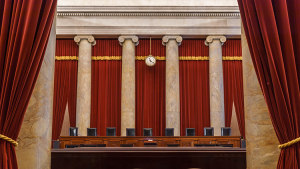By Anna Hargett
The Supreme Court heard its first arguments since the death of Justice Ginsburg last month.[1] The Court appeared divided upon hearing the arguments of Oracle and Google regarding software code copyright.[2] The Court is expected to rule in June on this case,[3] which has been called the “copyright case of the century.”[4]
Oracle alleges that Google infringed upon Oracle’s copyright when Google used thousands of lines of Java code without a license.[5] When Google developed its Android smartphone platform, it used Java code, which is now owned by Oracle.[6] The Java code operates as an application programming interface (“API”) that provides integration across multiple programs that “speak” to Java programs.[7] Based on these facts, the court will decide if copyright protection extends to APIs.[8]
In 2018, the U.S. Court of Appeals for the Federal Circuit ruled in favor of Oracle, holding that Google’s differing format of smartphone integration was not a significant transformation of the code and therefore could not fall under the “fair use” exception.[9] This ruling overturned a San Francisco jury’s finding that allowed Google’s usage of the code under the “fair use” exception.[10]
At argument, Oracle’s legal team harped on the specialization of the Java code, and defended claims by Google that the Java language merely acts as an organization system.[11] E. Joshua Rosencrantz, counsel for Oracle, defended the unique attributes of the code when Chief Justice Roberts analogized the language to the organization and description of a restaurant’s menu.[12] Rosencrantz replied by emphasizing that, “We fill in the blanks 30,000 times over,” and that “each item had its own description that no one else was using.”[13]
Google argued that the API language is not copyrightable.[14] However, counsel for Google focused more on the “fair use” exception, which Google argues would apply if the Court found that the language is protected.[15] The fair use exception would only apply in this case if Google proves that its use of Java was transformative in nature. [16] Google claims that since the code was used to create a new smartphone platform, it was significantly transformative.[17]However, Oracle views the platform change as infringement because it simply moves the same content into a different format.[18] Google also emphasized the fact that API use is commonplace in the industry, and that this method is the “only way” to accomplish this.[19] However, this did not sit well with Justice Gorsuch when he replied that other competitors such as Microsoft and Apple have been able to write their own languages.[20]
Both parties claim that ruling in favor of the opponent will stunt innovation.[21] If Oracle wins, Google claims that it will give software developers too much power by allowing copyrights by the giants in the industry and quelling competitors.[22] If the Court holds for Google’s fair use, or that APIs are not subject to copyright laws, then it will weaken copyright protections for computer programs and disincentivize innovation from that prospective.[23]
How will this decade-long legal battle end?[24] Based on the Justices’ questions, it seems that Oracle may have the upper hand.[25] However, the Court may decline to rule on API copyright altogether by ruling for Google on procedural grounds.[26] Either way, increased litigation in the software industry will likely ensue as a result.[27]
[1] Jan Wolfe & Andrew Chung, U.S. Supreme Court Divided Over Google Bid to End Oracle Copyright Suit, Reuters (Oct. 7, 2020, 6:04 AM), https://www.reuters.com/article/usa-court-google-oracle/us-supreme-court-to-mull-google-bid-to-end-oracle-copyright-suit-idUSKBN26S1H2.
[2] See id.
[3] Id.
[4] Adam Liptak, Supreme Court Hears Copyright Battle Between Oracle and Google, The New York Times (Oct. 7, 2020), https://www.nytimes.com/2020/10/07/us/supreme-court-google-oracle.html.
[5] Wolfe & Chung, supra, note 1.
[6] Ina Fried, 1 Big Thing: Supreme Court to Weigh Software’s Future, Axios Login (Axios, Arlington, V.A.), Oct. 6, 2020, https://www.axios.com/newsletters/axios-login-89adf203-c2b8-4ded-990b-0754b7bf29c3.html.
[7] Id.
[8] Id.
[9] Wolfe & Chung, supra, note 1.
[10] Liptak, supra, note 4.
[11] Id.
[12] Id.
[13] Id.
[14] Timothy B. Lee, Google’s Supreme Court Faceoff with Oracle Was a Disaster for Google, Ars Technica (Oct. 8, 2020, 11:00 AM), https://arstechnica.com/tech-policy/2020/10/googles-supreme-court-faceoff-with-oracle-was-a-disaster-for-google/.
[15] Id.; see 17 U.S.C. § 107 (2020).
[16] Wolfe & Chung, supra, note 1.
[17] Id.
[18] See Liptak, supra, note 4.
[19] Wolfe & Chung, supra, note 1.
[20] Id.
[21] Fried, supra, note 6.
[22] Lee, supra, note 14.
[23] Id.
[24] See Wolfe & Chung, supra, note 1.
[25] See Lee, supra, note 14.
[26] See id.
[27] Id.

Image Source: https://www.abajournal.com/news/article/kavanaugh_first_supreme_court_arguments
